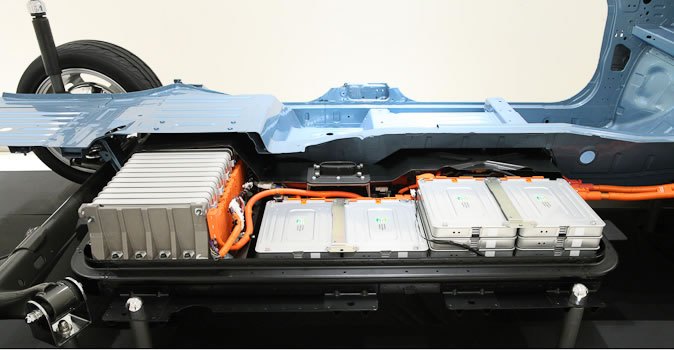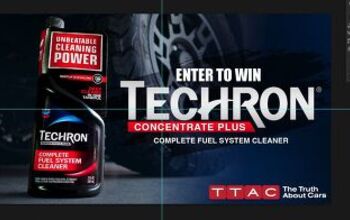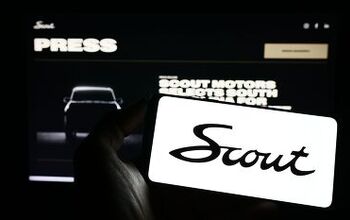Nissan Leaf Battery Packs Break The $400/kWh Barrier
AutoblogGreen‘s Sam Abuelsamid earns a tip of the blogger’s hat today for making sense of a fascinating nugget in a Times of London piece on the Nissan Leaf. The revelation by Nissan EV honcho Andy Palmer to the British paper that Leaf battery packs cost £6,000 (about $9k) to produce could have been missed, buried as it was near the bottom of the story. Not only did Abuelsamid catch it, he calculated that the Leaf’s 24 kWh lithium-ion battery costs break down to a staggeringly cheap $375 per kWh. How cheap is that, relatively speaking? Apparently cheap enough to send Li-ion startup A123 Systems’ stock to record lows according to the WSJ [sub]. More price-comparison context and some insight into how Nissan might have beaten those costs down after the jump.
Not convinced that Nissan’s claimed kWh price is really that big of a deal? Consider that just about six months ago, GM claimed that it could get lithium-ion prices down to $500/kWh by the Spring of 2011. In support of this claim, GM’s John Lauckner bragged that:
We’ve already seen significant reductions in the cost of batteries even since the start of the Volt program. At this point, we’re hundreds of dollars below the $1,000 a kwh benchmark
At the time, Ford said the cheapest Li-ion packs it could find were in the $700/kWh range, and these were manufactured exclusively in Asia. Even the hybrid king Toyota scoffed at GM’s prediction, with since-ousted VP Irv Miller laying on the sarcasm with a firehose:
I’ll buy all those batteries that anyone can provide me right now. Our numbers are about three or four times that, so maybe we’re missing something
So how has Nissan been able to drive so much cost out of such a crucial automotive component? For one thing, signs are pointing to a building oversupply of lithium-ion capacity. Earlier this year Deutsche Bank said it was already seeing large-volume bids of about $400/kWh for lithium-ion packs… although for all we know, they were talking about the Leaf. According to a study also published earlier this year by Roland Berger Strategy Consultants,
Planned investments [in lithium-ion battery production] will thus result in significant overcapacity between 2014 and 2017, especially in the US and in Japan. Given the announced investments, capacity in 2015 will already reach 200% of the demand projected for 2016. In addition, not all investments have been announced; as-yet unknown investments by key players will lead to further overcapacity, and national subsidies will stimulate even more investments.
Which means li-ion firms could be preemptively cutting costs in order to line up long-term business. Nissan and its battery partner NEC have had a joint venture to develop lithium-ion packs since 2007, so they may also have simply stolen a march on the competition. Moreover, Nissan’s efforts to build the Leaf and its battery packs have been heavily subsidized my several governments. Nissan has received $1.6b in Department of Energy retooling loans for US Leaf and battery production, while the UK battery assembly plant (which produces at the £6k price point) has received a $30m grant from the British government, and about $300m in financing from the European Investment Bank. If the automotive lithium-ion battery market is in fact headed for oversupply, these incentives will only drive prices down and companies like A123 out of business.
The final piece of this puzzle lies in the Leaf’s battery pack itself. As a pure EV, the Leaf will likely face less battery stress than a hybrid or extended-range EV like the Volt, since the battery won’t be fully discharged as often. Possibly because of this, Nissan has decided not to fit the Leaf with active thermal management, which almost certainly helped keep costs down. On the other hand, if Leafs have problems in the Southern California summer heat, those savings could come back to haunt Nissan.
More by Edward Niedermeyer
Latest Car Reviews
Read moreLatest Product Reviews
Read moreRecent Comments
- Turbo Is Black Magic My wife had one of these back in 06, did a ton of work to it… supercharger, full exhaust, full suspension.. it was a blast to drive even though it was still hilariously slow. Great for drive in nights, open the hatch fold the seats flat and just relax.Also this thing is a great example of how far we have come in crash safety even since just 2005… go look at these old crash tests now and I cringe at what a modern electric tank would do to this thing.
- MaintenanceCosts Whenever the topic of the xB comes up…Me: "The style is fun. The combination of the box shape and the aggressive detailing is very JDM."Wife: "Those are ghetto."Me: "They're smaller than a Corolla outside and have the space of a RAV4 inside."Wife: "Those are ghetto."Me: "They're kind of fun to drive with a stick."Wife: "Those are ghetto."It's one of a few cars (including its fellow box, the Ford Flex) on which we will just never see eye to eye.
- Oberkanone The alternative is a more expensive SUV. Yes, it will be missed.
- Ajla I did like this one.
- Zerofoo No, I won't miss this Chevrolet Malibu. It's a completely forgettable car. Who in their right mind would choose this over a V8 powered charger at the rental counter? Even the V6 charger is a far better drive.


































Comments
Join the conversation
You can charge a LEAF 100% but the battery may last twice as long at 80% charge and it still goes a true 100 miles. AT 100% you can't regen for the first few miles and battery life is "ONLY", 8 years 100K miles. I want 200K or more.
No Leaf will cheat you when you are out of battery leaving you in the halfway of the road while Chevy volt got two sources when the battery run-out you'll have the gas option. http://www.remarkabletrucks.com/